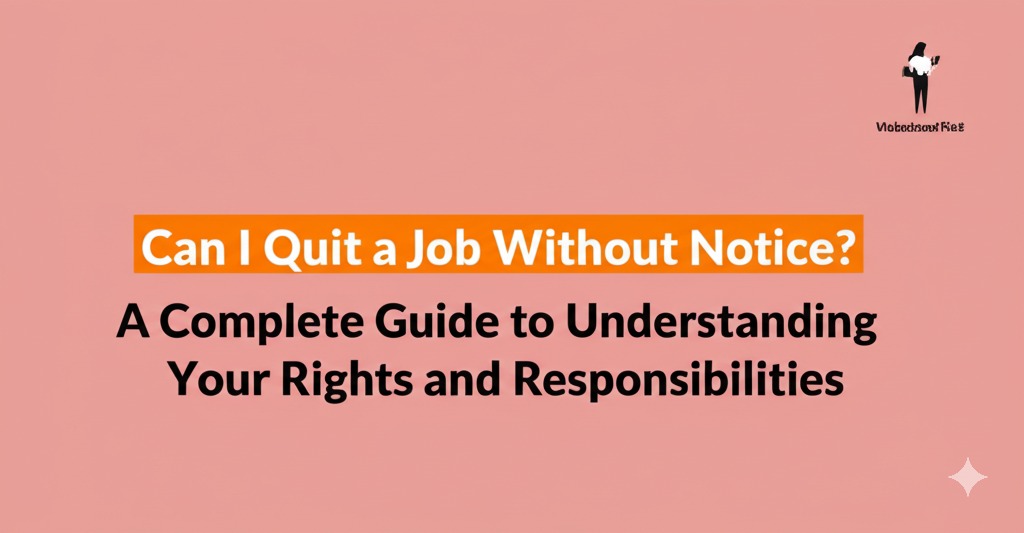
Quitting a job is never an easy decision, especially when emotions, financial obligations, and future career prospects are involved. But what if you feel that leaving your current job is the right move for your well-being or career growth? Can you simply walk away without giving notice, or is it legally and professionally risky to do so? In this article, we’ll explore the critical considerations surrounding quitting a job without notice and what it means for you as an employee.
Understanding the Importance of Notice Periods
A notice period is the length of time you are expected to continue working after you inform your employer of your intention to resign. Typically, this period ranges from two weeks to a month, depending on your contract and the company’s policies. But why do employers ask for notice in the first place?
Why Employers Require a Notice Period
- Work Transition: Giving notice allows the employer time to find a replacement and transition your responsibilities.
- Professional Courtesy: It maintains a professional relationship and avoids burning bridges.
- Legal Requirements: In some cases, employment contracts or company policies may legally require a notice period.
Understanding these reasons can help you weigh the pros and cons of quitting without notice.
Can I Legally Quit Without Notice?
In most countries, employment laws allow you to quit your job at any time, provided you follow the terms outlined in your contract. However, quitting without notice could potentially lead to legal consequences or damage your professional reputation.
Contractual Obligations and Potential Penalties
Some employment contracts explicitly state the required notice period and the penalties for failing to adhere to it. These penalties could include:
- Loss of Final Pay: Employers may withhold your final paycheck if you don’t comply with the notice period.
- Legal Action: If you breach the contract, the employer could take legal action for any damages caused by your sudden departure.
Before quitting, review your employment contract to understand your obligations.
The Impact of Quitting Without Notice on Your Career
Leaving a job without proper notice can have a lasting effect on your professional reputation. While you might feel justified in your decision, it’s important to consider how it could impact future job prospects.
How Employers Perceive Quitting Without Notice
- Damage to Your Reputation: Employers may see you as unreliable or unprofessional, which could harm your chances of getting future references.
- Loss of Trust: Your current employer may hesitate to recommend you to others or provide a glowing reference.
- Short-Term vs. Long-Term Consequences: While quitting might feel like the best option in the moment, the long-term damage could be significant if you don’t handle the situation with care.
Exceptions to the Rule: When Can You Quit Without Notice?
While most employees are expected to provide notice before leaving their jobs, there are certain situations where quitting without notice may be justified.
1. Harassment or Discrimination
If you are subjected to harassment or discrimination at work, you have the legal right to leave without notice. Many labor laws protect employees in these situations, allowing them to quit without facing penalties.
2. Unsafe Working Conditions
If your workplace is unsafe or puts your health at risk, you may be entitled to quit immediately without giving notice. Documenting these issues, however, is crucial for protecting yourself legally.
3. Breach of Contract
If your employer breaches the terms of your contract, such as failing to pay agreed-upon wages or changing your job duties drastically, you may have grounds to quit without notice.
4. Personal or Family Emergencies
In cases of medical emergencies or sudden family obligations, employees might be forced to quit without notice. While not ideal, these situations can be communicated and managed with transparency.
How to Quit Professionally Without Notice
If you’re considering leaving your job without notice, it’s essential to manage the situation as professionally as possible to avoid unnecessary complications.
1. Communicate Clearly
Even if you’re leaving abruptly, ensure you communicate openly with your employer. Let them know the reasons behind your decision, and offer as much assistance as you can during the transition.
2. Offer to Help with the Transition
If feasible, offer to help train a replacement or finish up any pressing tasks. This can soften the impact of your departure and show that you respect the organization.
3. Provide a Resignation Letter
A formal resignation letter is still recommended, even if you’re quitting without notice. This serves as documentation of your resignation and maintains professionalism.
4. Be Prepared for Consequences
Understand that quitting without notice may lead to a loss of severance pay, an unfavorable reference, or even legal consequences. Weigh these risks before making a final decision.
Conclusion: Should You Quit Without Notice?
Quitting a job without notice can feel like a liberating option, but it’s not always the best route to take. Consider your legal obligations, the impact on your career, and the personal factors that might be driving your decision. If you’re unsure, it might be worth speaking to an employment lawyer or HR professional to better understand your rights.
Ultimately, quitting with notice is the most professional approach, as it protects your reputation and future career opportunities. However, if circumstances force you to leave without notice, ensure you handle the situation as responsibly as possible to minimize potential negative consequences.

Andre Cuevas provides career insights, job search strategies, and professional advice to help individuals navigate the job market and achieve their career goals.






